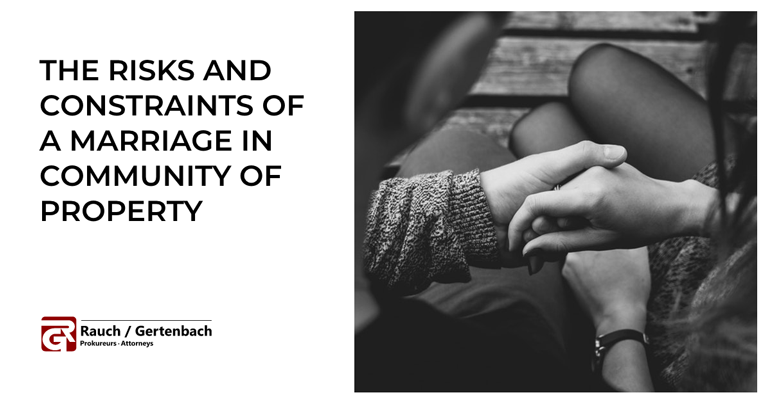THE RISKS AND CONSTRAINTS OF A MARRIAGE IN COMMUNITY OF PROPERTY
In terms of South African Law, couples are automatically deemed to be married in community of property if a valid antenuptial contract was not concluded between them prior to the conclusion of the marriage. The effect hereof is that a joint estate is formed from the assets and liabilities that belonged to either spouse before, and after, the conclusion of the marriage.
Despite marriages in community of property being the most common marital regime in South Africa, there are various risks associated herewith that can leave one or both spouses vulnerable in certain respects.
In terms of the Matrimonial Property Act 88 of 1984, spouses have to obtain consent from each other before entering into certain agreements such as contracts to alienate or obtain immovable property and credit agreements. An individual is therefore limited in their capacity to act since they cannot conclude certain agreements independently.
Secondly, both parties are jointly and severally liable for any debts that may have been incurred prior to the conclusion of the marriage as well as during the marriage. Where one spouse is declared insolvent, the joint estate is sequestrated, thereby negatively effecting both parties, not just one.
The costs involved in the administration of the joint estate upon the death of one of the spouses is often misunderstood. The executor’s fee will be calculated on the value of the joint estate, whereas it would have been calculated solely on the assets of the deceased if the marriage had been concluded out of community of property.
In addition to the increased executor’s fee, as mentioned above, the surviving spouse is jointly liable for the debts of the deceased estate, which must be settled prior to receiving any benefits from the deceased estate. After the settlement of the debt, the spouse becomes entitled to one half of what is left in the estate. The remaining one half will be distributed in terms of the will of the deceased or in terms of intestate succession in the absence of a valid will.
Where an inheritance has not specifically been excluded from the operation of a marriage in community of property in a testator’s will, the asset obtained by the heir will also form part of the joint estate. While a parent may have intended to leave an inheritance to their biological child, the asset will legally be regarded as being shared between the spouses should they be married in community of property
It is therefore important that the consequences of each matrimonial property system must be carefully considered and discussed with an expert in the field before a decision is made in this regard.
For more information, kindly contact Paul Delport at paul@rgprok.com . www.rgprok.co.za
Article by Paul Delport, LLB, Senior Associate (Notary)
___
Disclaimer
Nothing contained in this publication is to be considered as the rendering of legal advice for specific cases, and readers are responsible for obtaining such advice from their own legal counsel. This publication is intended for educational and informational purposes only.








